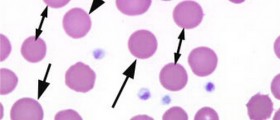
Fructose is a simple sugar. Fruits, vegetables, and honey are rich in fructose. Synthetic fructose is frequently used as sweetener and can be found in many foods such as baby food.
Hereditary fructose intolerance is a hereditary metabolic disorder which features with inadequate metabolism of fructose. It occurs because there is absence of specific liver enzymes necessary for proper metabolism of fructose. People suffering from hereditary fructose intolerance may eventually develop certain illnesses of liver, kidneys and small intestine related to excessive accumulation of unmetalbolized fructose. Accumulation of fructose also affects conversion of the glycogen into glucose which consequently results in hypoglycemia.
Symptoms of Hereditary Fructose Intolerance
The symptoms do not occur until the baby starts being fed with formula, juice, fruit and baby food which contains fructose. In the beginning the symptoms include intensive abdominal pain, vomiting and fever. Severe vomiting may cause dehydration. Additional symptoms are excessive thirst, urination and sweating. A child may lose appetite and weight. Hypoglycemia leads to tremor and seizures. In extreme cases there is liver enlargement and jaundice.
Parents are due to take their child to pediatrician if after being fed with formula or solid food the child develops symptoms such as persistent and severe vomiting, excruciating abdominal pain, unexplained fever, excessive thirst and urination, jaundice, loss of appetite and sudden weight loss.
The child may also develop symptoms of hypoglycemia. They include confusion, dizziness, trembling, hunger, headache, irritability, rapid heartbeat, pallor, sweating and fatigue. Hypoglycemia in such children is treated with an oral glucose tablet. If left untreated the child may develop symptoms of late hypoglycemia. They are inability to swallow, numbness of the mouth and tongue, problems with coordination, concentration and confusion and finally, unconsciousness. Severe form of hypoglycemia leads to coma.
Diagnosis and Treatment for Hereditary Fructose Intolerance
Diagnosis can be set after physical examination of the child and his/ her family medical history. If the disease is found in other family members it is highly likely that the child is suffering from the disease as well. This condition features with a specific gene mutations which can be identified by genetic testing.
Fructose can be detected in the child's urine and the doctor also performs several more tests including blood test for hyperbilirubinemia, functional liver test and fructose tolerance test.
There is no cure for fructose intolerance. The treatment is based on elimination of fructose in food. The symptoms may withdraw completely after this sugar has been eliminated from the diet. Mild symptoms of hypoglycemia do not require hospitalization and the child can be treated at home with oral glucose tablets or gel while severe hypoglycemia can be only treated in hospital.

















Your thoughts on this
Loading...